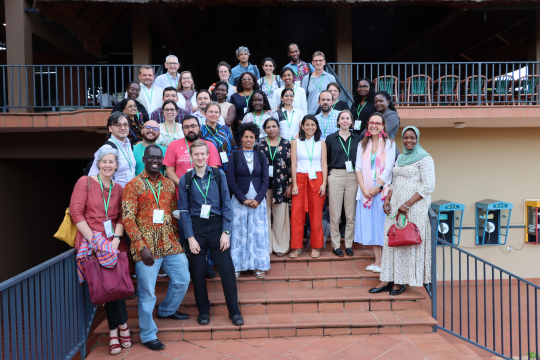Mintewab Bezabih is a Research Associate funded by EfD at the Department of Forest and Natural Resources Department at North Carolina University since March 2023. She is a member of the Women in Environmental Economics for Development (WinEED) network and has conducted a survey to find out more about the careers of environmental economists. The results will be shared at EfD’s Annual Meeting in October but there are some preliminary results already.
Tell us about the survey that you conducted on environmental economists.
Last year we launched a survey to analyze the career advancement and wellbeing of environmental economists in the Global South. The survey focused on professionals with a graduate degree in economics, agriculture economics, environmental and/or natural resource economics with at least an estimated 50% of time devoted to any of these areas of economics. The respondents were researchers at EfD centers or part of other networks.
Our goal was to look at how careers have progressed for environmental economists, with a special focus on women, and the barriers they deal with whether those are institutional, discriminatory, access to opportunities and support, and other questions related to well-being and mental health.
We will present the results at the next EfD Annual Meeting. Currently, we are analyzing the data. At this moment, we have found some preliminary interesting results for women. We have found that women have a higher turnover than men, and they work fewer hours. At the presentation, we will also make a comparison between the characteristics of career progression between men and women.
In the introduction of the survey, it says that it is also an aim of the survey to compare the experiences and career progression of environmental economists in the South with those of the North and scientists in STEM disciplines. What does the literature say about the progression of environmental economists in the North?
The consensus in the literature so far is that there exists more gender-bias in the field of economics than in the STEM disciplines. So, we expect the same patterns in our study too.
What activities are you supporting in WinEED?
I am supporting the participation of WinEED members in the monthly EfD webinar series. Last April 4, Amaka Nnaji and Raavi Agarwaal were the guest expositors at the seminar, and I was the host and moderator.
We also launched a call to support women researchers affiliated to EfD centers who want to submit a paper for the EfD Annual meeting. We will give them recommendations on how to enhance the level of their paper for the meeting.
I’m also contributing to bringing the gender issue to the forefront of the EfD’s next strategy. One task is to showcase the work on gender analysis done by EfD women members. All this work is not properly documented. We will also emphasize and mainstream gender issues in research into the EfD strategy.
The other task is to increase the visibility of the many WinEED members working within EfD and collaborating. This is a very gender-conscious network. Also, the early career program supports many women in the network, and many women have been trained by the PhD program.
Mintewab Bezabih’s research: she is an EfD Ethiopia researcher and works on topics related to gender analysis in connection with land access, crop biodiversity, communal grazing areas, women empowerment, and nutrition access. She is also very involved in the topic of green economy. EfD Ethiopia was established to support Ethiopia’s strategy for climate resilience, which was implemented from 2011 - 2021. Together with other researchers, she supported these national efforts in different ways. They evaluated climate-resilient or green economy activities and the adoption of climate-resilient practices. She was also the leader of a project to develop the monitoring and evaluation systems of the strategy. All these efforts have served as input for the country’s next strategy.
By: Manuela Fonseca (Comm officer for WinEED and EfD Colombia)
